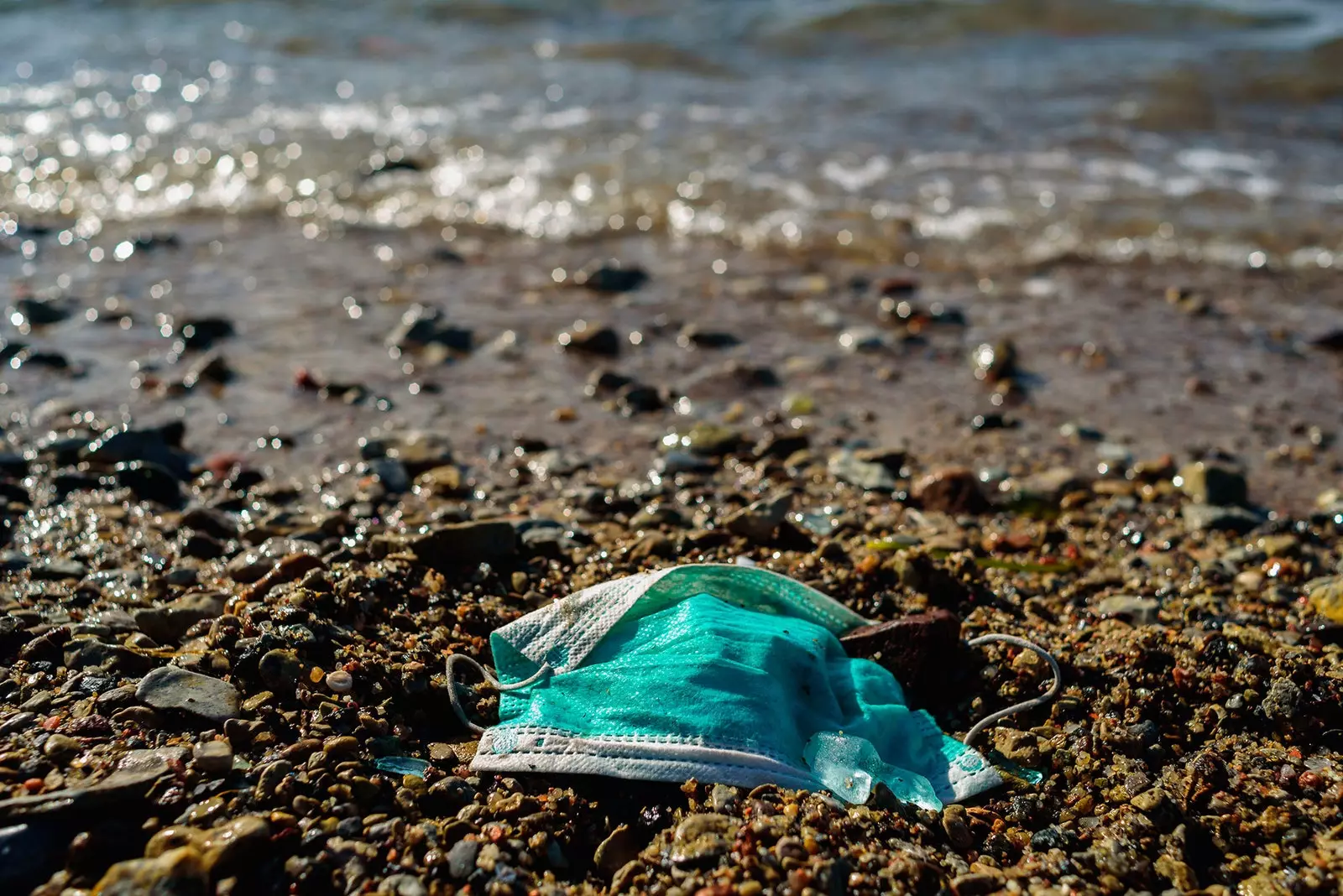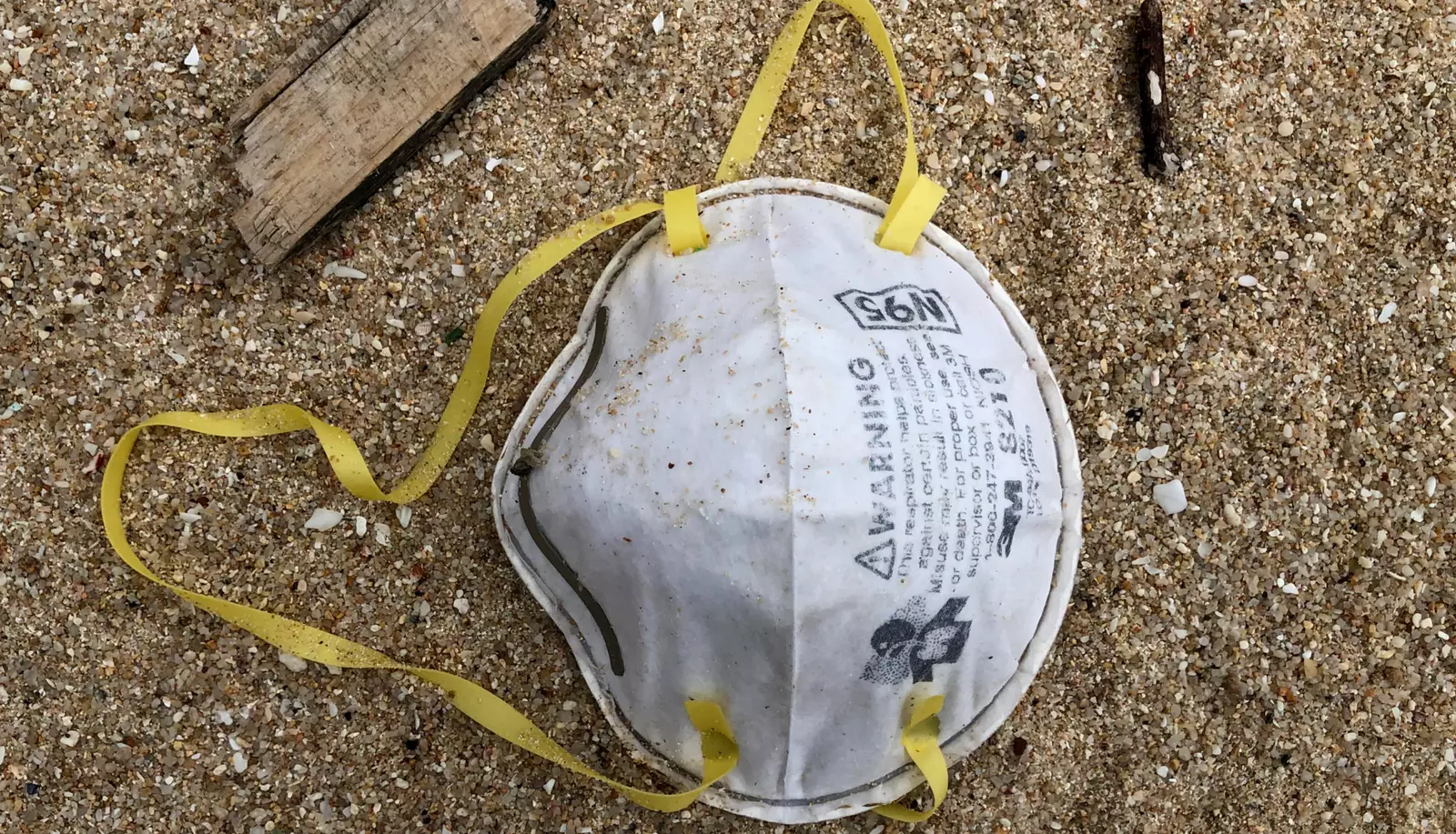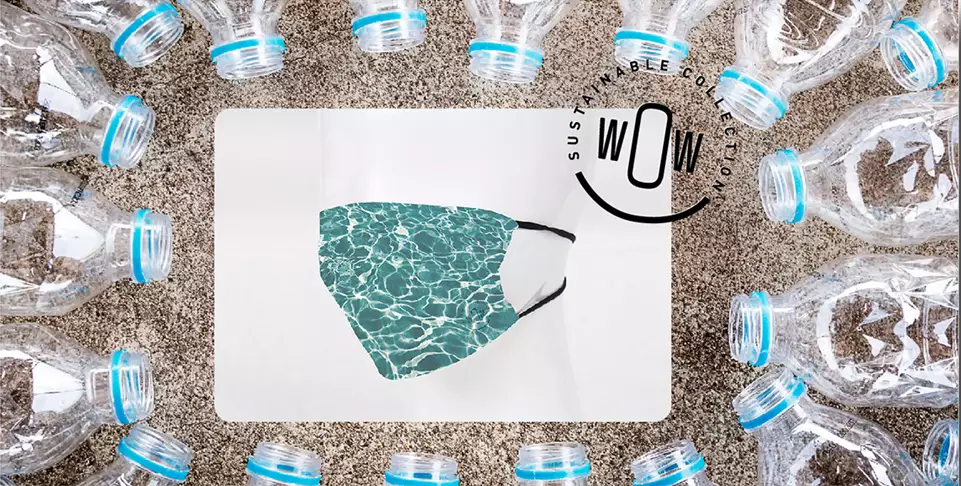
More masks in the sea than in the mouth: the coming pandemic
It's just a cigarette butt down the drain, the baby wipe down the toilet, a plastic bag forgotten by the seashore, a hastily used condom behind some bushes and now, more than ever, a mask in the middle of an open field where children play . They are well-known and unknown pictures that have a common denominator: the feeling of impunity of the incivil act as if the planet were not finite. Something that has grown exponentially at the precise moment that awareness of caring for the environment has ceased to be a topic of conversation.
It is undeniable that the sudden cessation of economic activities to stop the spread of the pandemic has caused some positive environmental events . The hole in the ozone layer in the Arctic is closing and air and water quality have improved markedly, despite some hyperbolic fake news. However the plastic lobby lives in the middle of the festival with an exponential growth in its world production thanks to the boom of millions of single-use masks to prevent the spread of coronavirus.
To give us an idea, Italy alone estimates that it will need 90 million masks for a month .And that's just the beginning. Sooner or later, so many masks had to appear somewhere. This is how Oceans Asia testifies during its visit to the Soko Islands, near Hong Kong . The tides and ocean currents brought with them thousands of used masks, leaving a bleak picture . “When you suddenly have a population of 7 million people with one or two masks a day , the amount of garbage generated will be considerable”, say the activists. Although you don't have to go that far to find the same environmental tragedy. “ The Cantabrian coast threatened by the abandonment of masks and gloves on its coasts ”, headlined El Diario Cantabria just a few days ago.
A problem that will grow as the leaders of many states are assessing that it is inevitable its mandatory use in spaces where social distancing is impossible . This is the case of Spain, which today Wednesday May 20 formalized the use of masks on the street and closed spaces . To avoid abuses due to its high demand, the Executive set the price of surgical masks at 0.96 euros per unit , without taking into account a collateral effect: the used mask is useless after 24 hours, and becomes an annoying object, a source of infection and a new problem for the planet.
Although it seems like a truism, live without plastic has been showing for 5 years that is it possible to live without plastic . Faced with the gale of plastic containers that fill our daily lives without realizing it, Patri and Fer they have served as an aspirational model for many unbelievers of residual minimalism to reconcile with the world. The new challenge they face is that, just as you can live without plastic, Now you can't (and shouldn't) live without a mask . And the big question arises: How can we activate people's social conscience so that thousands of masks do not end up in the sea or on the ground when their top priority is to breathe clean air?
“Raising awareness is not always easy . This crisis, so urgent and immediate, has postponed all other crises. Masks are now a necessity but, unless you work in front of the public or in a healthcare environment, you can use reusable cloth masks and wash them with soap and water, ”says Live without plastic. The Government of Spain has given the go-ahead to cloth masks for daily (non-hospital) use and has even published a guide for the correct cleaning and disinfection of these . Patri and Fer defend that“ if there are people who feel safer with the disposable ones, there is no problem either . If we only used disposables during pandemics they wouldn't have become a problem but proper disposal in the trash is essential”.
From Living without plastic they do not believe that a different message should be sent to correctly dispose of disposable masks than to correctly dispose of any other waste. “ It can help raise awareness from a health point of view , but those who now throw masks on the floor or down the toilet They are the same people who before the pandemic were throwing wipes down the toilet or throwing butts on the floor. Now there is more garbage because more disposables are used , not because there has been a change in our perception of the garbage we generate. That's why we think the message should be the same: take responsibility for the waste you generate, it is yours, not the council or the cleaning people”.
The truth is that yes, there is more garbage . Much more garbage that implies a step backwards in the reduction of plastic. Two significant examples that have come to the fore. In Asturias, the Covid-19 pandemic has multiplied by four the volume of hospital waste in con 185 tons in the month of April alone . And in Valencia, 134 tons of waste were recovered from 20 nursing homes in less than a month. Considerable figures that have an impact on the great mass consumption of other disposable plastics, such as bags, water bottles, containers for home delivery of food or online purchases. In the latest Ecoembes report, what many did not want to see was uncovered: “ The recycling of packaging through the yellow container has risen 15% since the start of the state of alarm ”. An increase that has a lot to do with a forced confinement in homes and with a drastic change in shopping habits in the supermarket.

The new reality: masks add to the waste that ends up in the sea
To this bleak panorama, we must add that many people do not know that these masks contain a filter material made up of a tangle of plastic fibers . Being a source of infection and propagation of the virus, they are not recyclable and must be disposed of in the appropriate container so that they can then spend three days in quarantine before being incinerated or incorporated. to the bulk of the garbage and without risk of contamination.
“The masks, even if they are not 100% plastic, they do have plastic among their components . We do not believe that anyone thinks that masks are harmless, it is clear that gloves , which can be seen to be made of plastic (or latex), are also invading the streets. We believe it is essential that you do not panic about these products. The authorities do not recommend the use of gloves to go outside because it can be counterproductive . We must inform with official data and provide simple solutions so that we do not fall into the generalized fear of using unnecessary disposables thinking that they protect us, when it could be the opposite. The problem is that according to official sources, several thermal treatment facilities for hospital waste are starting to become saturated , and it has been decided to divert part of this waste to urban solid waste treatment facilities, with the risk of being able to generate emissions of carcinogenic compounds such as dioxins and furans.
back to citizen consumption , all recycling experts agree on the same point: the use of single-use masks is something new, since never before had it been used at a domestic level in such a massive way . “That is why we do not believe that it is the fault of the manufacturers or the rush to sell masks ahead of time, but that We are facing a new situation and we must find solutions quickly . But, seeing the problems they are causing, a new label should be added, advising, among other things, how to dispose of them correctly”.
An issue with manufacturers you've had to deal with Edgar Novellon, CEO of Connectad , A company of sustainable merchandising products . ”The health emergency has definitely made us forget sustainability, although in this case I recognize that it was difficult because the masks are generally delivered without packaging and without instructions for use. In addition, since they are not recyclable, it has not been possible to do much pedagogy. I think that we lack common sense and ecological education as a society”, emphasizes Edgar after successfully opening a channel specialized in anti-Covid protection .
For the selection of masks, hydroalcoholic gels or protection kits He strictly adhered to a non-negotiable premise: “Discard manufacturers if the product is not perfect and, secondly, promote reusable and recycled products , which is the most efficient way to limit waste and the use of raw materials”. Right now they are marketing two types of masks that are being very well received. “We have reusable masks made in Catalonia. They are washable up to 25 times, so we greatly reduce waste. And others that are made in a 70% recycled plastic bottles . They are also reusable, so the benefit to the environment is twofold. In addition, buying these masks collaborates with the Plastic Bank® , helping in the elimination of plastic bottles from the oceans and in combating poverty”.
As a company in the world of merchandising, Edgar Novellón knows very well that without an imaginative solution there is no sale. That is why he has opted for “ fully customizable mask models , so many companies have already been interested in acquiring them to distribute to their customers and employees”. Because no one can rule out that the mask ends up being a gadget like a cap, a smartphone case or wireless headphones. In this way, gaining a plus of personality from the wearer, perhaps someone discovers his bad breath but he will do the good deed of the day ridding the sea of an undesirable object.

There are reusable masks and those created from recycled plastic
HOW TO RECYCLE MASKS
Single-use disposable masks are NOT recycled . Being a source of infection and spread of the virus, they are not recyclable and must be disposed of in the appropriate container. Single-use masks and latex gloves DO NOT go in the yellow bin , where the plastic containers and wrappers, cans and briks go. not even blue Where does the paper and cardboard go? Nor to the green igloo , where the glass bottles and jars go. not to brown , where the remains of organic matter go. Used masks and gloves must be deposited in the general or rejection container , which is where we throw all the waste that is not recycled. In this way, the waste management companies will keep the masks and gloves in quarantine for three days before being incinerated or incorporated into the bulk of the garbage, without risk of contamination.
